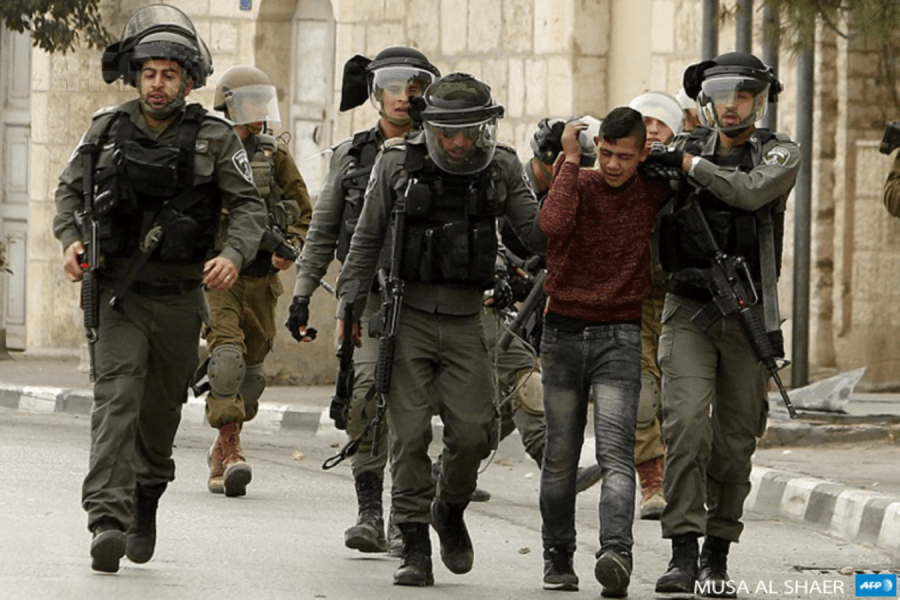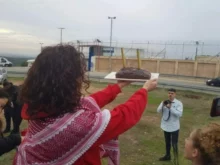Ramallah, March 19, 2020 (Updated on April 13, 2020)—Defense for Children International – Palestine calls on Israeli authorities to take immediate action to release all Palestinian child detainees in Israeli prisons due to the rapid global spread of the novel coronavirus (COVID-19).
Palestinian children imprisoned by Israeli authorities live in close proximity to each other, often in compromised sanitary conditions, with limited access to resources to maintain minimum hygiene routines, according to documentation collected by DCIP. COVID-19’s impact is exacerbated by these living conditions making Palestinian children in Israeli prisons and detention centers increasingly vulnerable.

Take Action: Demand Israel release all Palestinian child detainees immediately »
As of April 13, 11,235 people in Israel had tested positive for the COVID-19 virus, and 110 have lost their lives, according to Ha’aretz. Four Palestinian prisoners detained at Israel’s Megiddo prison, located inside Israel northwest of the occupied West Bank city of Jenin, were placed in isolation after they were in contact with an Israeli officer who was infected with COVID-19, according to Ha’aretz. Megiddo prison is one of several detention facilities located inside Israel where Palestinian child “security prisoners” are held.
“We know the best way to prevent the spread of COVID-19 is for people to avoid being in close proximity to each other,” said Ayed Abu Eqtaish, Accountability Program director at DCIP. “There is no way Israeli prison authorities can ensure the health and well-being of Palestinian child detainees as long as they continue to be in a custodial detention setting.”
By the end of January 2020, 183 Palestinian children were detained in Israeli prisons, according to the latest figures released by the Israel Prison Service (IPS). While international law demands that children only be detained as a measure of last resort, custodial pre-trial detention is the norm for Palestinian children detained by Israeli forces from the occupied West Bank.
An investigation by DCIP previously found Palestinian child prisoners detained in Israel’s Damon prison were held in poor conditions, including small rooms without access to clean and private bathroom facilities. Conditions such as these increase risks and exposure to unsanitary conditions where the COVID-19 virus thrives.
In April 2020, two Palestinian child detainees were suspected of being infected with COVID-19 at Israel’s Ofer prison, located in the occupied West Bank between Jerusalem and Ramallah, where many Palestinian child detainees are held. The two boys were examined and after testing negative for COVID-19 they were sent back to their prison room three days later.
One Palestinian adult detainee in Ofer prison tested positive for coronavirus in the adult section closest to the juvenile block where over 50 Palestinian child detainees are held, according to information collected by DCIP.
While IPS staff reportedly clean and disinfect the shared prison yard on a daily basis, prison cells and rooms are not being disinfected. Detainees at Ofer prison, including child detainees, are not provided with hygiene products, according to information collected by DCIP.
Israeli authorities have canceled family visits to detainees and utilized video conferencing for court hearings, often with detainees absent from the proceedings, according to information collected by DCIP.
Israel has the dubious distinction of being the only country in the world that automatically and systematically detains and prosecutes children in military courts that lack fundamental fair trial rights and protections. Israel detains and prosecutes between 500 and 700 Palestinian children in military courts each year. Nearly three out of four Palestinian children detained by Israeli forces experiences some form of physical violence, according to documentation collected by DCIP.
Since 1967, Israel has operated two separate legal systems in the same territory. In the occupied West Bank, Israeli settlers are subject to the civilian and criminal legal system whereas Palestinians live under military law. No Israeli child comes into contact with the military courts.
Israel ratified the UN Convention on the Rights of the Child (CRC) in 1991, obligating itself to implement the full range of rights and protections included in the treaty, including that the best interests of the child must be a primary consideration in all decisions affecting children. The CRC demands that children must only be detained as a measure of last resort, and obliges states to ensure and protect the right to life, survival, and development, as well as the right to health.
As of April 12, worldwide there are 1,696,588 cases of COVID-19, and 74,237 fatalities, according to the World Health Organization.
In the occupied West Bank, including East Jerusalem, and the Gaza Strip there were 272 confirmed cases of persons infected with COVID-19 as of April 13. Palestinian Prime Minister Mohammad Shtayyeh declared a state of emergency across the Occupied Palestinian Territory on March 5 in an attempt to contain the spread of COVID-19. On April 3, it was extended for an additional 30-day period.
Michael Lynk, UN Special Rapporteur for the situation of human rights in the Palestinian Territory occupied since 1967, in a statement released on March 19 urged Israel, the Palestinian Authority and Hamas to live up to their international legal responsibilities by ensuring that the right to health is fully provided to Palestinians in Gaza and the West Bank, including East Jerusalem, during the COVID-19 pandemic.
“The legal duty, anchored in Article 56 of the Fourth Geneva Convention, requires that Israel, the occupying power, must ensure that all the necessary preventive means available to it are utilized to ‘combat the spread of contagious diseases and epidemics,’” said Lynk.
Israeli authorities must take immediate action to release all Palestinian child detainees in Israeli prisons and detention centers due to the increasing vulnerability created due to the rapid global spread of the COVID-19 virus and to safeguard their right to life, survival, development, and health in accordance with international law.






